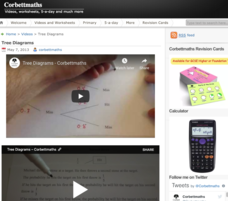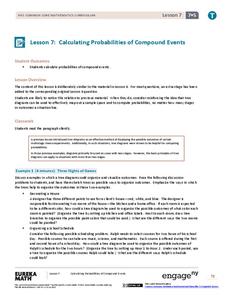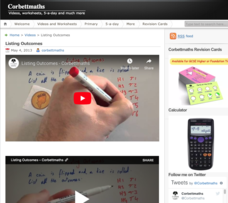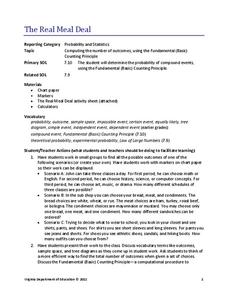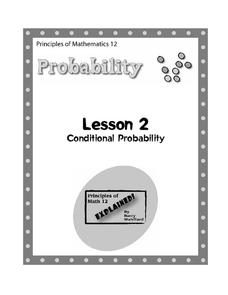EngageNY
Using Tree Diagrams to Represent a Sample Space and to Calculate Probabilities
Cultivate the tree of knowledge using diagrams with two stages. Pupils create small tree diagrams to determine the sample space in compound probability problems. The lesson uses only two decision points to introduce tree diagrams.
Corbett Maths
Tree Diagrams
Climb out on a branch to find probabilities. Using tree diagrams, the resource shows how to find compound probabilities when the events are not uniform. The video works through two different scenarios, one where the probabilities remain...
Curated OER
Data Analysis, Probability, and Discrete Math
Choose to supplement your probability unit with this resource and you won't be disappointed with the outcome. Teach young mathematicians to organize information using tree diagrams and lists in order to determine the possible outcomes of...
Curated OER
Tree Diagrams
In this tree diagrams worksheet, students draw a tree diagram to represent a given situation. They identify the total number of outcomes. This one-page worksheet contains 5 multi-step problems.
EngageNY
Calculating Probabilities of Compound Events
Use tree diagrams with multiple branches to calculate the probabilities of compound events. Pupils use tree diagrams to find the sample space for probability problems and use them to determine the probability of compound events in the...
Curated OER
Tree Diagrams
In this tree diagram activity, learners read story problems. From the given information, they draw tree diagrams to determine the total possible number of outcomes. This one-page activity contains ten problems.
Curated OER
Represent Outcomes
In this possible outcomes activity, students analyze a tree diagram of music and theater events. Students solve 6 story problems.
Curated OER
Tree Diagrams
In this tree diagrams worksheet, students solve and complete 10 different problems that include creating tree diagrams. First, they toss a coin and roll a die simultaneously to determine the outcomes with a tree diagram. Then, students...
Corbett Maths
Listing Outcomes
Make a list and check it twice. Many times, it is beneficial to make a list of the possible outcomes when trying to determine a probability. The resource shows how to systematically make a list and then calculate the probability of...
Curated OER
Integrated Algebra Regents Questions: Combinations and Probability
In this combinations and probability worksheet, students solve 3 short answer problems. Students draw tree diagrams to represent possible outcomes in a sample space. Students determine the probability of an event.
Virginia Department of Education
The Real Meal Deal
Burgers and salads and sodas, oh my! Scholars use a menu to investigate the Fundamental Counting Principle. They create tree diagrams to illustrate the number of possible choices for each given scenario.
Curated OER
Data Management and Probability: Applications
In this data management and probability applications worksheet, 7th graders solve 13 different types of problems that include finding the mean, median, mode, and range of each set of values, as well as, solving a number of word problems....
Curated OER
Multiplication Law for Independent Events
In this multiplication law of independent events worksheet, 9th graders solve 9 various types of problems that include independent events in each. First, they determine the probability in a bag of marbles given the specifics on the...
Curated OER
Listing Outcomes
In this probability activity, students learn how to make a tree diagram to determine the possible outcomes in a probability situation. They then answer 4 probability questions.
Curated OER
Probability: Grade A
Math whizzes explore dependent and independent outcomes. They determine the outcome of simple and compound events. Pupils complete tree diagrams to identify outcomes. They identify fair and unfair games. This two-page learning exercise...
College Preparatory Mathematics
Geometric Probability
In this geometric probability worksheet, students solve and complete 12 different problems that include determining the outcomes of various types of probability. First, they use a tree diagram or an area model to compute the desired...
Curated OER
Find Probability
In this finding probability learning exercise, students use a tree diagram and a grid to discover the probabilities and possible answers. Students answer six problems.
Math12
Basics of Probability
Give your students a fighting chance at understanding probability. Offering numerous examples that clearly demonstrate basic probability concepts, this resource helps young mathematicians learn how to visualize the...
Curated OER
Probability - Worksheet
Middle schoolers solve and complete four various types of problems. First, they list all the possible orders completed. Then, pupilscomplete the table and show all the outcomes of throwing a coin and spinning a spinner. They also use a...
Curated OER
The Counting Principle, Sample Spaces, and Probability
In this statistics and probability worksheet, students solve problems in which they use the counting principle and/or tree diagrams to determine the number of outcomes of an event or the probability of event occurring. The three...
Math12
Conditional Probability
Conditional probability can be a confusing concept. A straightforward lesson provides reasonable examples of conditional probability, and models the most effective ways to reinforce the more complex parts of the lesson.
Curated OER
Unit 10 Section 2: Finding Outcomes With Two Experiments
In this experiment worksheet, 5th graders study 5 examples and their outcomes. Students then respond to 8 questions, completing the responses to outcomes and probability.
National Council of Teachers of Mathematics
Is It Fair?
In this probability instructional activity, learners answer nine questions about the fairness of games. High schoolers determine if a game is fair or not. They list outcomes and find ones' chances of winning.
Curated OER
Probability
In this probability instructional activity, students explore theoretical probability, empirical probability, tree diagrams, and conditional probability. This twenty-four page instructional activity contains approximately 80 problems....

